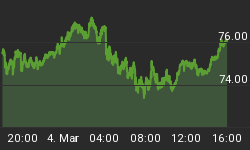The following is part of Pivotal Events that was published for our subscribers Thursday, October 23, 2008.
SIGNS OF THE TIMES:
Big Ones:
"No One Wants to Burst Greenspan's Bubble"
"Those close to Mr. Bernanke believe he can handle any worrisome economic conditions given his academic pedigree. He scored 1590 out of a maximum of 1600 on his SATs, has an economic degree from Harvard, and a doctorate from MIT. He has taught at Princeton for 17 years."
- That was from the February 1, 2006 edition of the Financial Post, which included a comment from Robert Frank who wrote a textbook with Dr. Bernanke:
"I'll bet on Ben's ability to see what is coming around the next corner over just about anybody else."
Some perspective on power and monetary madness is provided in an observation made by Mayer Rothschild in 1836:
"Give me control of a nation's money, and I care not who makes the laws."
In 2002 there was an event to honor Milton Friedman, and Bernanke's address included:
"I would like to say to Milton and Rose: Regarding the Great Depression you're right, we [the Fed] did it [caused the depression]. We're very sorry. But thanks to you [Friedman] we won't do it again."
In so many words, Bernanke claimed that the Fed had learned its lessons. The problem is that those (including Friedman) who have claimed that the post-1929 contraction was caused by a policy blunder have been wrong.
With adequate research anyone would conclude that great contractions are caused by great financial manias.
In the summer of 2006 there was a droll review of corporate ambition. It might have been titled "Bonfire of the Inanities":
"Corporate executives are increasingly turning to debt for the cash they need to feed stock investors with share repurchases, dividends and empire building."
- Wall Street Journal, July 11, 2006
Even as late as last December academic boasting continued:
"How to Avoid Recession? Let the Fed Work"
"The truth is that Fed governors, together with their crack staff of Ph.D economists and market analysts, are as close to an economic dream team as we are ever likely to see."
- Gregory Mankiw, Harvard economist and textbook author,
New York Times, December 23, 2007The world is not just suffering a financial contraction ranking with the worst in history, it is also witnessing an intellectual collapse.
The first of a series of matches is almost over and the score is:
Mother Nature And The Margin Clerks:[1]
Academics And The Central Planners: [0]
* * * * *
INTEREST RATES
Credit Spreads: As widely celebrated, Libor has come down. Before the crisis became acute Libor had been rigged to prevent bad things. This along with so much "rescue" money flowing into the banking system since August served to narrow money market spreads.
Then under accumulating pressure the markets attended to artifice with some violence. Libor, which had been "fixed" at around 280 bps for weeks started to rise in the middle of September to panic conditions at 482 bps on "Black Friday". Much the same held for dealer commercial paper until the panic hit when the rate jumped from around 276 bps to 520 bps.
Relative to the treasury bill plunging to 0.0%, spreads for both instruments widened shockingly. That acute phase of the crisis was accompanied by the usual dramatic changes in money market conditions, from which there has been some easing. Some have attributed it to policy efforts, but more than likely it was natural relief.
Whatever, every time "they" had a bailout the stock markets made new lows. Considering the size and frequency, perhaps the authorities have become exhausted with their rescues. In which case the markets could rally and this is being set up by some natural ease in money markets possible in late October.
At the long end, corporate spreads continued to widen to yesterday and are due for some relief.
The Yield Curve steepened with the panic and has been quiet. Some flattening seems possible, but the interesting possibility is for the next leg down in price for the long bond. Support was possible at the 112 level and the bounce with renewed stock selling made it to 116.
Traders have been playing the short side. Investors have been positioned in the five-year note.
Tales From Before The Crypt:
"Industrial and business news continues excellent, and market confidence is unimpaired. The change in the Federal Reserve Bank's rate [discount rate increased from 5% to 6% earlier in August] appear to have galvanized the share market into activity, the initial reaction followed by a strong recovery, in which many leading shares touched new high levels.
"Meanwhile it is believed that the authorities are likely to increase rather than diminish the total volume of reserve credit, and that call rates will be lower and stable."
- The Economist, August 17, 1929
In 1929 call money, which was the cost of overnight money to brokers, went from 4.5% to 20% during the boom. It is worth recalling that the relatively high rates attracted considerable amount of money into Wall Street, with much of it disappearing in the crisis.
Link to the Friday, October 24, 2008 'Bob and Phil Show' on Howestreet.com: http://www.howestreet.com/index.php?pl=/goldradio/index.php/mediaplayer/1003.















